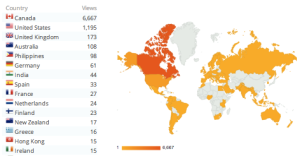As we have wrapped up our study of Philosophy 12 for the year (to be continued in September if enough people enroll in the for-credit portion of the course), I wanted to document a few initial elements of the class statistics and participation before the analytics widget goes to sleep and isn’t around to be compared to future data. (What the collection of such statistics mean to me as a teacher is something I have yet to form an opinion about just yet; but the numbers are a piece of the story being told, one way or the other.) I also wanted to highlight the contributions of a few people who, though they may not have been enrolled formally in the class, were formidable members of the learning community.
These are some things I can tell you at this stage:
In five months, the class blog was viewed 9,000 times; visitors come from 82 countries, and every continent but Antarctica. 600 of those visitors arrived on our site by Google Image searches, thus creating the lasting legacy of Nick Kraemer in that no one who ever blogged with him will ever push publish without embedding an engaging photograph.
The blog averaged 51 comments a month, many of them ranging into the thousands of words themselves.
A few posts that attracted a lot of this thought and conversation over the course of the semester were:
- Liam’s post on good and evil, “Nature? What Nature?“
- Nick’s “Utilitarianism: Do the ends justify the means?“
- Iris’ inquiry into Liebniz’ theory of the Monad
- Steph’s introduction to the Metaphysics of John Locke
- Daniel’s look at ethics on teh Internetz
In addition to a handful of students each credited with more than 15 individual comments – Liam, Jen, Jonathan, and Yazmeen – two of the course’s most prolific commenters were open online participants.
Stephen Downes is a researcher with the NRC’s Institute for Information Technology’s e-Learning Research Group, and one of the pioneers in the field of ‘open-teaching.’ Not surprisingly, perhaps, Downes was an avid participant at various points during the semester; but the bulk of his 31 comments came during the class’ Logic unit, where he rigorously interrogated each of the for-credit students’ proposed syllogisms.

Such was the notability of Downes’ work in the class, he became the fodder of more than one plausible thesis:
The only man who patrols his territory under his own power and initiative, who strikes fear into the heart of wrong doers in the dead of night, and does these things with only the tools and skills he has acquired through training himself to extremely high levels, is Batman. Thus, the first premise is true.
Then, we have the second premise: Stephen Downes patrols his patrols his territory under his own power and initiative, strikes fear into the heart of wrong doers in the dead of night, and does these things with only the tools and skills he has acquired through training himself to extremely high levels.
With my limited knowledge of Stephen Downes, I suspect these all to be true. His territory is the internet, which he prowls with the knowledge that if he sees non-desirable behavior, he will put an end to it. We can see this from the recent slew of comments this blog has received from him, in which he combats the non-desirable behavior of faulty logic. As he is not part of any organization, nor is this blog any sort of immediate or non immediate threat, he is under his own initiative to do this. Through reactions from other students, I am able to see that he inspires a certain amount of fear, but there has been nothing fatal. A time stamp from one of his comments will show that he commented in what would be the dead of night in this time zone. And finally, Downes does not use superpowers, he uses the advanced knowledge and skills in philosophy and logic that he has trained to obtain. The second premise seems to be true.
There is only one conclusion.
Hope to see you back on the #Philosophy12 blog in the Fall!



3 thoughts on “Looking back on #Philosophy12”
Comments are closed.